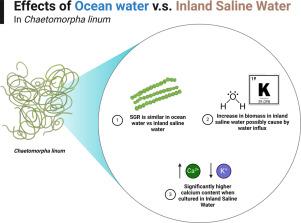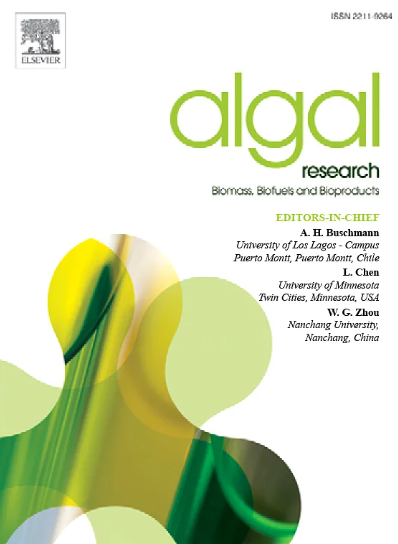Growth and biochemical composition of green seaweed Chaetomorpha linum (O.F. Müller) Kützing (1845) cultured in a range of ionic profiles
IF 4.6
2区 生物学
Q1 BIOTECHNOLOGY & APPLIED MICROBIOLOGY
Algal Research-Biomass Biofuels and Bioproducts
Pub Date : 2024-10-22
DOI:10.1016/j.algal.2024.103769
引用次数: 0
Abstract
Seaweed aquaculture in Inland Saline Water (ISW) can utilise degraded land to produce valuable products. ISW is characterized by its different ionic profile to ocean water (OW), particularly the ratios of sodium (Na+) to potassium (K+) ions, and magnesium (Mg2+) to calcium (Ca2+) ions. The feasibility of seaweed cultivation in varying ionic profiles is not yet well understood. This study investigates the growth of Chaetomorpha linum by length (SL) and biomass (TB), cultured in several ionic profiles by mixture of ISW with OW over two 15 day experiments. The first experiment (EXP 1) investigated growth across a broad range of ionic profiles. C. linum was then cultivated across a more specific range of profiles in the second experiment (EXP 2), based on EXP 1 results. Tanks (50 L) were randomly organised outdoors and salinity was maintained at approximately 25 ppt. SL and TB of seaweed was recorded every 3 days. The proximate and mineral composition of harvested seaweed on Day 15 was also analysed. A significant negative correlation (p < 0.001, r = −0.835, n = 13) was observed between non-discrete TB specific growth rate (SGR) and increasing K+ of media in EXP 1. A significant positive correlation (p < 0.001, r = 0.769, n = 28, EXP 1) was observed between potassium (K) in dry matter (mg.g−1) and K+ in media, suggesting lower K+ in media causes increased TB due to higher water flow rate into cells. Calcium (Ca) content (% d.b.) was much higher in K+ deficient media, indicating Ca accumulation occurs in cells during ion homeostasis when K is not available. Positive SL SGR's across ionic profiles also indicate this species is capable of a high level of internal ion regulation. This study provides context for commercial cultivation of C. linum in varying water types, and presents an avenue for salinity-affected dryland farmers to diversify their income through ISW aquaculture.

在一定离子浓度范围内培养的绿藻 Chaetomorpha linum (O.F. Müller) Kützing (1845) 的生长和生化成分
内陆盐水(ISW)中的海藻养殖可利用退化土地生产有价值的产品。内陆盐水(ISW)的特点是其离子状况与海水(OW)不同,特别是钠离子(Na+)与钾离子(K+)的比例,以及镁离子(Mg2+)与钙离子(Ca2+)的比例。在不同离子状况下栽培海藻的可行性尚不十分清楚。本研究通过两个为期 15 天的实验,研究了在多种离子状况下通过混合 ISW 和 OW 培养的 Chaetomorpha linum 的长度(SL)和生物量(TB)的生长情况。第一个实验(EXP 1)研究了多种离子状况下的生长情况。根据 EXP 1 的结果,在第二次实验(EXP 2)中,亚麻酸藻在更具体的离子浓度范围内生长。水槽(50 升)在室外随机布置,盐度保持在约 25 ppt。每 3 天记录一次海藻的盐度和盐浓度。还分析了第 15 天收获的海藻的近似物和矿物质成分。在 EXP 1 中,非离散 TB 特定生长率(SGR)与培养基中 K+ 的增加之间存在明显的负相关(p < 0.001,r = -0.835,n = 13)。 在干物质中的钾(K)含量(mg.g-1)与培养基中的 K+ 之间存在明显的正相关(p < 0.001,r = 0.769,n = 28,EXP 1),这表明培养基中的 K+ 越低,进入细胞的水流量越大,从而导致 TB 增加。钙(Ca)含量(% d.b.)在 K+ 缺乏的培养基中要高得多,这表明当 K 缺乏时,细胞中的钙会在离子平衡过程中积累。不同离子状况下的正 SL SGR 也表明该物种能够进行高水平的内部离子调节。这项研究为在不同水质中商业化养殖亚麻藻提供了背景,并为受盐碱影响的旱地农民提供了一条通过ISW水产养殖实现收入多样化的途径。
本文章由计算机程序翻译,如有差异,请以英文原文为准。
求助全文
约1分钟内获得全文
求助全文
来源期刊

Algal Research-Biomass Biofuels and Bioproducts
BIOTECHNOLOGY & APPLIED MICROBIOLOGY-
CiteScore
9.40
自引率
7.80%
发文量
332
期刊介绍:
Algal Research is an international phycology journal covering all areas of emerging technologies in algae biology, biomass production, cultivation, harvesting, extraction, bioproducts, biorefinery, engineering, and econometrics. Algae is defined to include cyanobacteria, microalgae, and protists and symbionts of interest in biotechnology. The journal publishes original research and reviews for the following scope: algal biology, including but not exclusive to: phylogeny, biodiversity, molecular traits, metabolic regulation, and genetic engineering, algal cultivation, e.g. phototrophic systems, heterotrophic systems, and mixotrophic systems, algal harvesting and extraction systems, biotechnology to convert algal biomass and components into biofuels and bioproducts, e.g., nutraceuticals, pharmaceuticals, animal feed, plastics, etc. algal products and their economic assessment
 求助内容:
求助内容: 应助结果提醒方式:
应助结果提醒方式:


